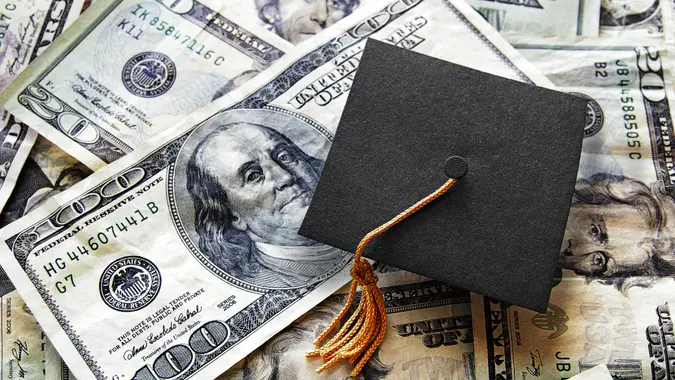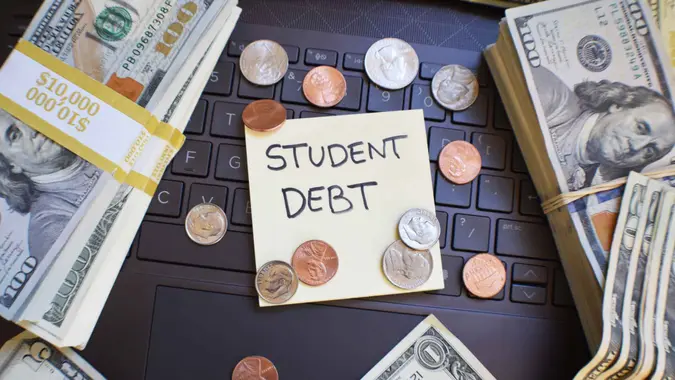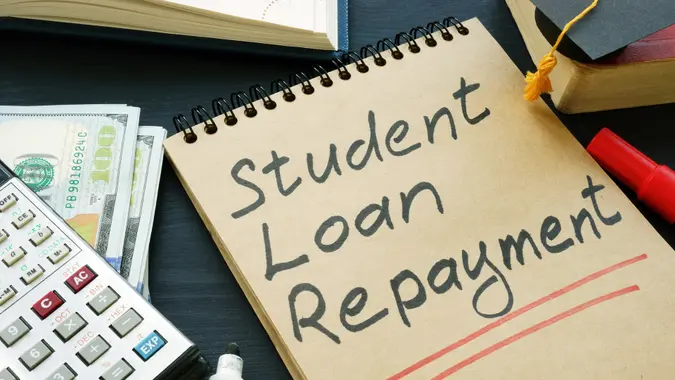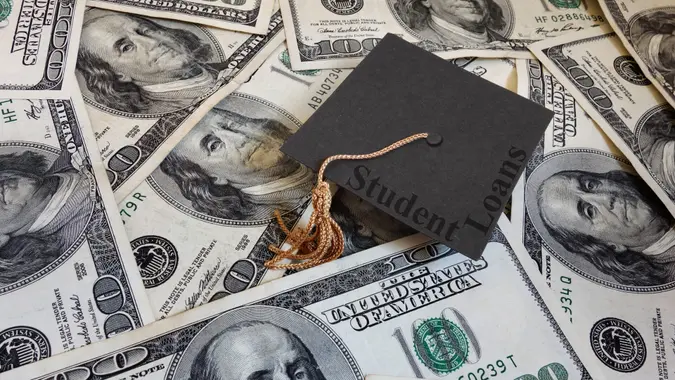Here’s Why Some Self-Made Millionaires Are Still Paying Off Student Loan Debt

Commitment to Our Readers
GOBankingRates' editorial team is committed to bringing you unbiased reviews and information. We use data-driven methodologies to evaluate financial products and services - our reviews and ratings are not influenced by advertisers. You can read more about our editorial guidelines and our products and services review methodology.

20 Years
Helping You Live Richer

Reviewed
by Experts

Trusted by
Millions of Readers
Think millionaires live debt-free? Think again.
Some millionaires still opt to carry mortgage loans and auto loans. Some carry business loans — or even student loans. In fact, the Education Data Initiative reported that 58% of student loan debt is held by the top two quintiles of income earners.
Take Peter Landis, chief marketing officer of Noble House Buyers, who prioritizes investing over debt paydown. “With low interest rates on my loans, I realized I could get a much better return by putting my money into appreciating assets,” he said.
Landis learned that just because you can pay off a debt early doesn’t mean you should. Here are a few reasons some self-made millionaires are still paying off student loan debt.
Liquidity
Sometimes you need cash, and lots of it.
Consider an entrepreneur looking to start a business. They need all the cash they can get, and often look to take on more debt, not less. Imagine if they said, “My dream can wait — I need to pay off my student loans before I can consider starting my business career in earnest.”
Dennis Shirshikov, the founder of iTutor.com and an economics professor at the City University of New York, said he sees this all the time among his clients and alumni.
“A lot of self-made millionaires keep their student loan debt on purpose, and it serves as a strategic asset for them rather than a liability,” he said. “Low interest rates tied to many student loans, particularly those under federal programs or income-driven repayment plans, can make them attractive to keep rather than pay off.”
As surplus cash comes in, borrowers could pay off their student loans, of course. Or they could use that money to start or grow a business, for emergencies, or to invest.
Higher Returns Than Interest
In some cases, borrowers can earn far higher returns by investing their extra cash than the interest they’d save by paying down student loans early.
Many certified financial planners even recommend that some clients do exactly that. “I’ve worked with millionaire clients who still have student loan debt,” explained Trevor Ausen, founder of Authentic Life Financial Planning. “We’ve generally maintained the debt and paid it off as scheduled when the interest rate is low enough that they are likely to have a higher rate of return by investing their cash.”
If your loan costs you 5% in interest and you can earn 10% annualized returns, does early debt paydown really make more sense than investing?
Shirshikov shares this outlook. “One of my clients decided to invest in a valuable real estate opportunity with their extra cash, rather than paying down their student loans faster. They were happy they did so,” he said.
Mindset Shift: Good vs. Bad Debt
Good debt makes borrowers richer in the long term. Bad debt — like taking on credit card debt to pay for restaurant meals or the latest fashions — makes them poorer.
Instead, imagine someone taking out a business loan to launch their dream business. Or borrowing a mortgage to buy a rental property that generates an extra $500 in cash flow every month. That’s precisely what Landis does: “Instead of throwing every extra dollar at my loans, I used that money to invest in properties and generate cash flow,” he said. The debt enables him to actually earn more each month.
For that matter, taking out student loans to earn a bachelor’s degree could serve the same end. According to the Bureau of Labor Statistics, college graduates earn a median income nearly double that of high school graduates.
But as surplus cash begins flowing in after these “good debts” start paying off, borrowers have to decide what to do with it. Sometimes, it makes sense mathematically to pay off the debt — especially if it carries a high interest rate. Other times, if the interest is low or their cash needs are great, it may make more sense to leave the debt in place.
Many millionaires know to give these financial decisions a second thought rather than doing anything by reflex.
The Priority: To Sleep Well at Night
The math outlined above does matter. But it isn’t everything.
Ausen has seen plenty of clients decide to pay off their student loans early, even when it made more mathematical sense to leave it in place. “These clients are so happy the day their loans are paid off, even though they would have been better off paying it as scheduled. They did the right thing for their own peace of mind, which matters more than the numbers.”
Peace of mind has its own value and worth. If you’d sleep better at night knowing you’re debt-free, then do what feels right for you — regardless of what the calculator says.
 Written by
Written by  Edited by
Edited by 

























